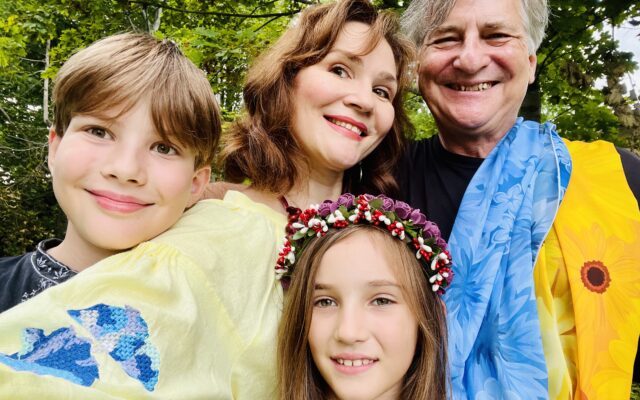
A year into war, Ukraine shows me there are different ways to be brave
When I moved from Ohio to Maine a little more than a year ago, I didn’t expect to be talking with a Ukrainian woman about blinchiki and syrniki. Yet here I was, just this week, interviewing Olga Zhuravel Maselli — a new connection in our small, rural town of Dover-Foxcroft — about how a year of war has affected her and changed the lives of her family.
She surprised me by asking about my favorite Ukrainian dishes, which is where the pancakes come in. Her husband and two children love them too. We laughed about how there is no real recipe for syrniki, how the ingredients that give the small, golden pancakes their light texture might be yogurt, sometimes sour cream, or whatever you have in the fridge, and they come out different but somehow the same each time.
The exchange reminded me of my mother, who left Ukraine with my father and two siblings in August 1993, and how I have never quite managed to recreate the dish to taste like her version.
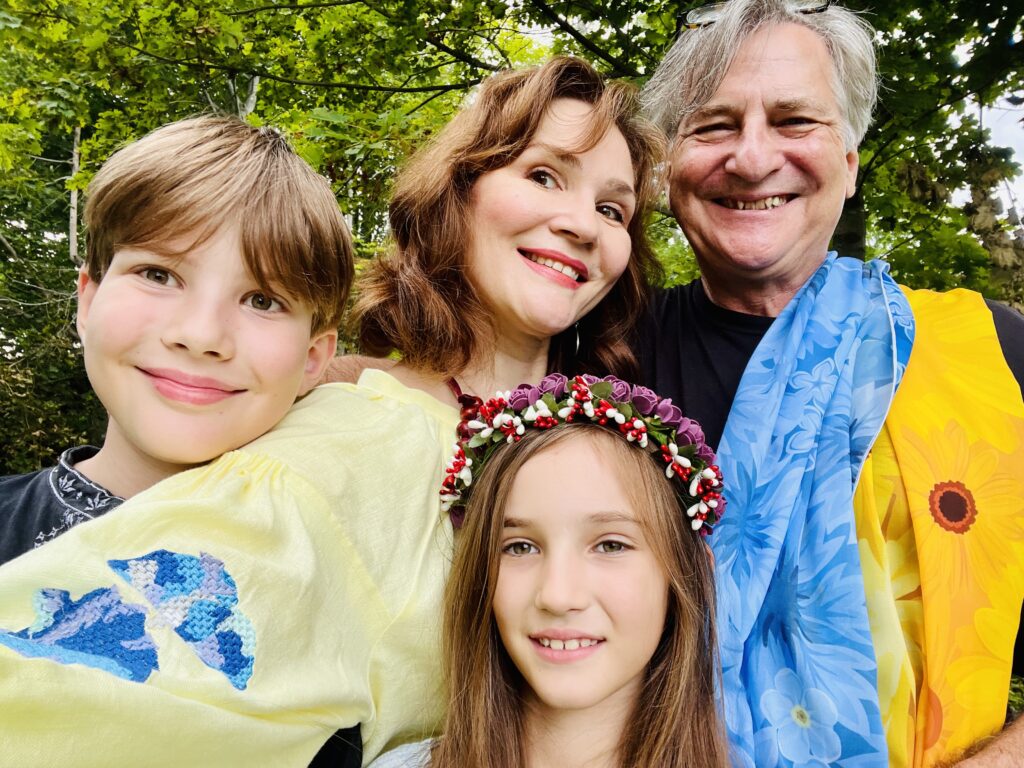
Olga Zhuravel Maselli, who lives in Dover-Foxcroft, is pictured with her husband, William, and two children, William and Lilly. They dressed in traditional Ukrainian attire in celebration of Ukraine’s Independence Day this past summer.
I spoke with Olga — an opera singer who built her career in Italy and later moved to the United States after falling in love with her current husband — about how the conflict in Ukraine hasn’t unfolded as anticipated.
Vladimir Putin expected Ukraine’s capital, Kyiv, to fall in just days. People predicted that Ukraine’s president and top officials would flee, that outnumbered soldiers fighting against incessant bombing stood no chance and that Russian troops could just blow Ukraine out like a candle. But against overwhelming odds and immeasurable tragedy, Ukraine is still standing one year later.
“They all believe in our victory. I believe in it,” Olga tells me. “They’re saying that they will not surrender, and no matter what, they will protect the land that is ours. That is the Ukrainian philosophy. We don’t want anything of yours. We want only to keep what is ours.”
Olga in Dover-Foxcroft, Kateryna Bagrii in Ellsworth and Masha Kotova in Waterville told me about the homeland and the places that are sacred to them. Replaying our conversations in my head, I keep returning to how the war in Ukraine is a lesson on bravery. Not bravery in the cliche sense that elicits images of heroes and men shouting as they run toward smoke and death. That will always be present during war.
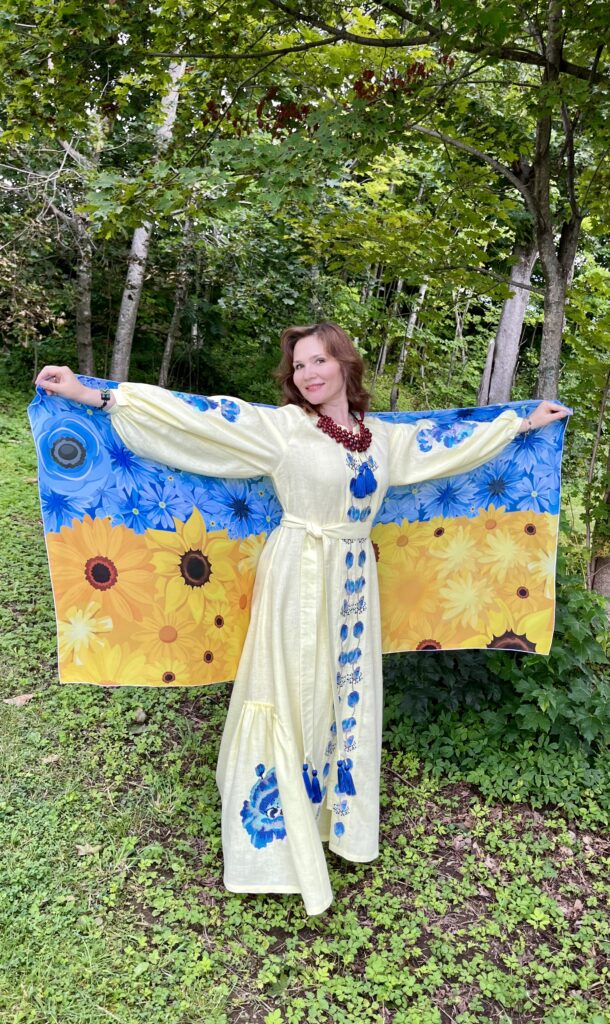
Olga Zhuravel Maselli donned a vyshyvanka, or a traditionally embroidered Ukrainian dress, in celebration of the country’s Independence Day in August.
These women have revealed to me the quiet, enduring bravery of their families living under constant threat. The bravery that buoys a person’s spirit in the silent moments between explosions.
Olga, Masha and Kateryna are pillars of bravery, too, displaying the strength needed to face each day, unsettled and anxious, unable to ignore the war ravaging their cities and threatening the people they love.
In many ways, I could relate to their feelings, worrying about my relatives overseas. When the war first broke out, I felt like I could go an entire day holding my breath. For months, even as a journalist, I couldn’t bear to read the news coming out of Ukraine, and even asking my closest cousin for updates about her life in Kyiv began to feel hollow. My feelings have morphed and changed, but these women have helped me understand that there is something brave about just moving through the world some days.
Olga, 47, is from Horishni Plavni, a mining city along the Dnipro River in central Ukraine. The area has remained relatively safe, but she says sirens still scream daily. It made me think of my relatives in places such as Kropyvnytskyi and Znamenka, also located centrally, whose biggest challenges this winter have been the rationed electricity and water. I am thankful every day that most of them are in areas that have not been targeted like the capital and eastern regions of the country.
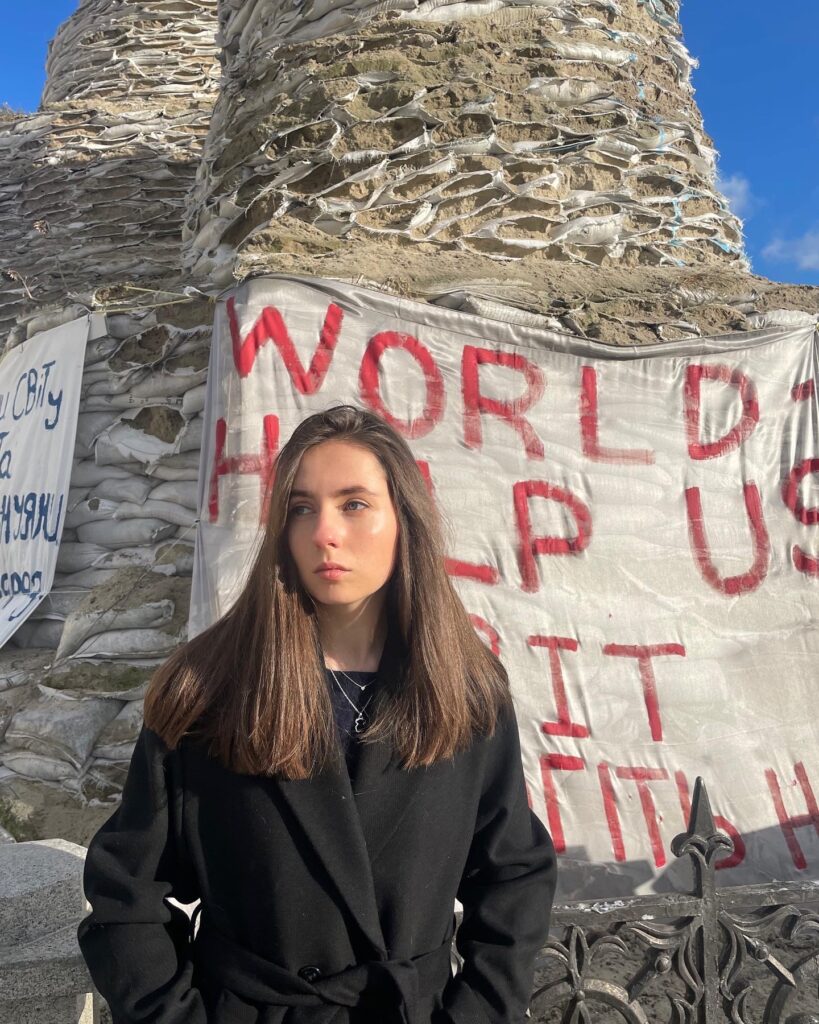
Masha Kotova is pictured standing in front of the statue of Princess Olga of Kyiv, which is now protected with sandbags in Ukraine’s capital.
Donning a bright blue cardigan and scarf with sunflowers, which have become a global symbol of solidarity, Olga tells me that her mother hasn’t slept in pajamas all year. She always seems to be dressed, with shoes on and a bag with documents and necessities packed and by her side.
When Olga connects with her family on video calls, she sees the pressure weighing on them. Her mother’s hair is grayer, her wrinkles deeper, she says. People have told her that they feel like they’ve aged years in just 365 days.
“They say it, and I see it,” she tells me. “I see the tiredness in their eyes. And when they are laughing or something, I see they are sad.”
Olga’s father died from a heart attack last May, and she wasn’t able to go to his funeral. She thinks that some people there are dying from stress because it’s like they live for the quiet in between air raid alarms.
Although the Poltava region differs from the persistent bombardment of places such as Donetsk and Luhansk in eastern Ukraine, Olga’s mother and brother were only miles away from a bustling shopping mall set ablaze in June. Russian missiles killed at least 21 people and injured dozens of others at the building in Kremenchuk, though the reports vary.
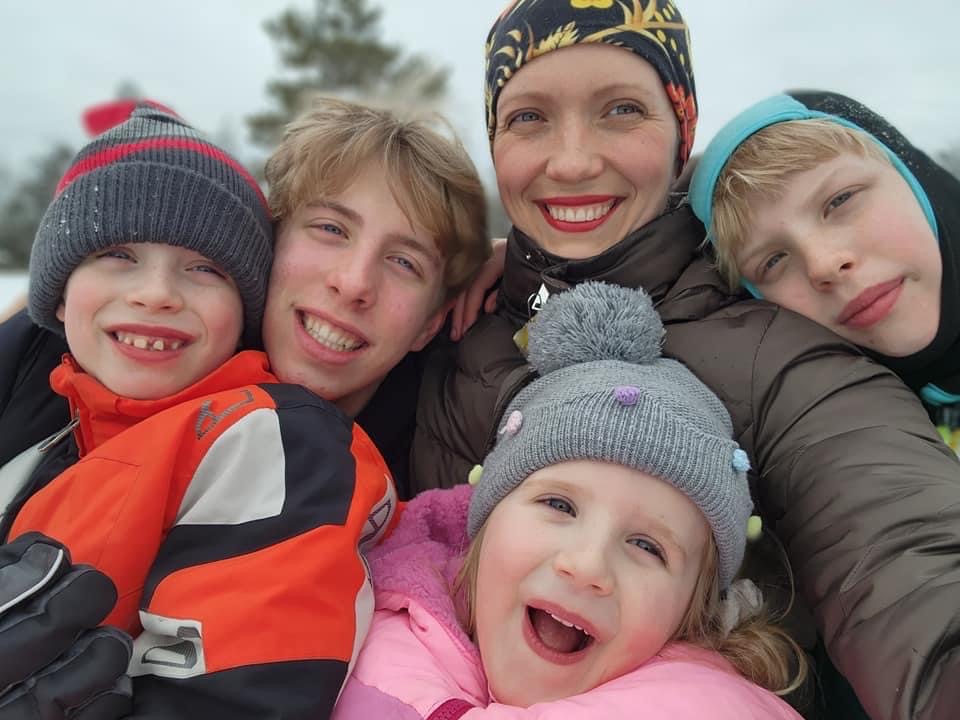
Kateryna Bagrii, who lives in Ellsworth, is pictured with her four children. From oldest to youngest are Andrew Bagrii, Michael Bagrii, John Campbell and Kateryna Campbell.
Olga’s mother, who was about two miles away tending to her garden, felt the ground rumble beneath her and saw a black plume of smoke in the sky, though she only learned about the attack later that day.
Olga, who runs a vocal and piano studio in Dover-Foxcroft and is directing music for an upcoming show at the Center Theatre, has turned to music as therapy. She also colors mandalas and does Painting by Numbers.
Even though Olga grew up primarily speaking Russian and only fluently learned Ukrainian as a college student, she has mostly switched over to the language of her motherland. The words sound so melodic, so why not speak it more, she said.
Conditions are different in Donetsk, a city in eastern Ukraine and one of two regions that make up the Donbas, which are key to Putin and Moscow’s troops. War has been raging there since 2014, when Kateryna Bagrii left the country and came to the United States. The last year has exacerbated the conflict, but it isn’t new, she says.
Kateryna, a mother of four, works as a nurse at Maine Coast Hospital in Ellsworth and teaches in the nursing program at Beal University. Her parents, grandmother, brother and his family live in Donetsk. She tries to keep in touch every week, but they don’t like to worry her with too many details about what’s happening at home.
Kateryna, 37, recently shared a neighbor’s video on Facebook from December, and she recognized the burned-out vehicles and buildings and shattered windows. It was the neighborhood where she once biked and played.
“I’m heartbroken, I guess,” she says, about the images, which also show people walking down the street and businesses that appear to be open. “I don’t know how to describe it any better. Devastated. I don’t think I have any anger toward any side. I do not accept violence from either side of the conflict. I think that all sides are doing wrong to each other.”
Working as a doctor when the conflict began in 2014, and having been raised by two doctors, Kateryna says medical professionals take a Hippocratic oath to help people — all people. Ukrainians or Russians, everyone is treated the same way in the region’s hospitals, she says.
Kateryna’s mother works as an obstetrician at a maternity hospital in the city, which has extensive damage, but she delivers babies wherever it’s safe. Sometimes that’s in the basement, and other times it’s in people’s homes. Water for hand-washing and surgeries is limited, which is a huge challenge, she says.
Kateryna, who is also studying for her master’s degree, focuses her attention on raising her kids and working, and even tutored a small group learning the Ukrainian language at the University of Maine last fall.
She’s “trying to be as close as possible” to her country and culture, sometimes explaining the war in gentle ways to her children. Her two oldest sons are mostly fluent in Ukrainian, she says, though they resist speaking it unless they want to be discreet or use it as a superpower to impress their friends.
“We mostly try to keep the spirit up because most of our conversations happen around the kids,” she says about the times she’s able to get through to her parents. “We try not to make them upset, and concentrate on our appreciation for getting connected. You never know the next time it will happen.”
Masha Kotova, a senior at Colby College, was studying in London, England, and was scheduled to fly home to Kyiv the day the war began last February. But as missiles flew, the air space closed and the most nerve-wracking period of her life began.
In the first days of the war, Masha remembers a video call with her parents, where her mother walked out onto the balcony to show her that everything was all right. Falling through the sky was a massive burning missile, moments away from landing nearby, she says.
Masha — who studies economics and plans to work at Blackstone, a global investment business in New York, after graduation — set alarms for every hour of the night in the early days of the conflict. She would check her messages with family and her best friend, look at the news, then try to sleep.
Early in the war, Masha’s parents fled with her grandmother to a safe area in southwestern Ukraine. They stayed in a rental for about a month, with friends coming and going, then returned to Kyiv. They have sheltered at home on the 16th floor of their building and remained safe, though there have been times when Masha has begged them to leave or hide elsewhere. Masha, an only child, even tried at the start of the invasion to coordinate their escape.
“I have learned this year to trust my parents more with their choices and their lives,” she says, even though it’s difficult. They’re usually optimistic, and she knows they make decisions based on what they’re hearing and observing around them.
Over the summer, her parents returned to work, her mother as an administrator at a dental clinic and her father at manufacturing company Michelin. But Russian troops began targeting the city’s infrastructure again in October, so the concept of safety has fluctuated. Masha also wrestles with the idea that her father could be drafted for the war, as it’s common to see draft letters handed out on the streets and while moving between cities or border crossings, she says.
Masha, 22, traveled home in December, and it was the first time that she had seen her parents in a year. At least if anything terrible happened, she thought, they would all be together.
“I arrived by [train] in Kyiv, and I remember this hectic station with military officers,” she tells me. “There were so many weapons in plain sight. The city looked very different. It was dark outside, and there was this massive bombing like two days before.”
Masha expected that she wouldn’t be frightened to return home because she was caught up on the latest news and felt prepared. But seeing a transformed city was scary and unsettling, she says, and she didn’t want to reveal her worries. It took about two weeks before she could breathe easier, and Masha even tuned into a college class from a bomb shelter, snapping a selfie and sending it to her professor.
Masha, who stays occupied with schoolwork and volunteering for Gen.Ukrainian — a non-governmental organization that helps Ukraine’s children traumatized by war — says she has started to view the conflict differently in some ways.
She tells me she was selfish in the beginning and wanted fighting to end at any cost, even if that meant negotiating with Russia or giving up the eastern region. But now she sees there is no alternative to the war, and in a strange way, there is a price to pay for independence. The terms are more important than the timing, she says.
The war, Masha says, has led more of the world to awaken to difficult realties. Too many Americans are feeling safe. It isn’t that they should fear for their lives, but they often take safety for granted, and anything could happen at any time.
I think she means that we, in our comfortable corner of the world, are not untouchable.
A year into this war, it feels like everything is different, yet nothing has changed. Each day is filled with hope for small victories. Ukrainians whose world once stopped, in many places, have returned to work. Sometimes this is interrupted by an explosion. Masha’s father, once frustrated with Kyiv’s traffic jams, has never been happier to see the long lines of vehicles. Kateryna’s mother, caught in a still moment or while Donetsk is under fire, is still bringing babies into the world. Life moves on.
“You know Ukrainians,” Olga tells me. “War or not war, we need to think about the future. We believe in life — that it will go on. If not for us, then for our children.”
Royzman is a reporter for the Piscataquis Observer/Bangor Daily News originally from Toledo, Ohio. Valerie is a proud daughter of immigrants from Ukraine. She has relatives in Kropyvnytskyi, Kyiv, Odesa and Znamenka. You can read her first-person accounts here and here.